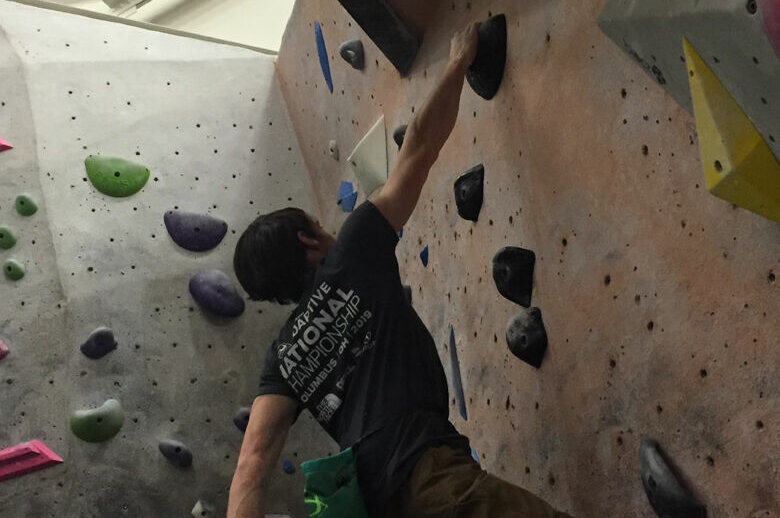Ben Mayforth grew up in a family of risk-taking athletes. The 25-year-old also grew up with VATER syndrome.
It means a form of spina bifida that impacts his legs. It means not having a full rib cage on the right side, which impacts the core muscles. It means having one kidney, and having a liver where it’s not supposed to be.
What it doesn’t mean is a life free of risks and competition.
The Bel Air, Maryland, man played four years of wheelchair basketball at the University of Missouri. Nowadays, he’s into “bouldering” — rock-climbing without cables or harnesses.
“When I told my mom that I was getting into climbing, she was a little worried, as moms are,” Mayforth said. “But my dad was like, ‘Yeah, he’ll be fine.'”
More than fine, actually. And, this Saturday, he will compete in an adaptive bouldering competition at Earth Treks’ Rockville location.
Mayforth sees it as part of a trend toward inclusivity, welcoming people of all abilities.
“I think climbing in general is a sport about proving to yourself that you can actually do something,” Mayforth said. “I’m always the type of person that just wants to prove to myself that I can go harder, stronger, faster, in all aspects of my life. For other people, it’s more about pushing the boundaries of what they truly can do.”
“That’s just a general human thing.”

Mayforth works as a climbing instructor at Earth Treks’ Timonium location, where he spends some of his time working with other adaptive athletes (i.e. those with physical disabilities) get into the sport.
“Whether or not it’s something they think they can do, in actuality, it’s definitely something they can do,” said Mayforth. “It might take some tweaking to the setup of the wall that’s there for them to scale, but it’s all doable.”
In most cases, athletes will scale the walls without a rope and harness — though, depending on their disability, there are exceptions to be made. In addition, the walls will be set up more symmetrically than most walls are, so that someone who might be weaker on one side of their body can still climb up.
And, because Mayforth knows he won’t be able to climb boulder walls forever, he’s enjoying it while he can, knowing that it helps him physically, even as his body might fall apart faster than others’.
His performance in recent competitions has exceeded expectations, he said — something he attributes to transcending a metaphorical wall.
“I think we all try to push our boundaries to find out what we truly, honestly can do,” he said. “I think we hold ourselves back a lot as humans. And, as soon as we push through that barrier … you’d be actually surprised what you can actually do.”








